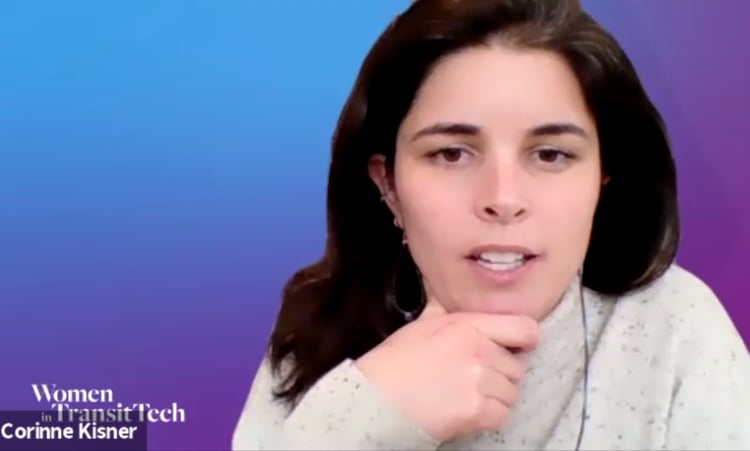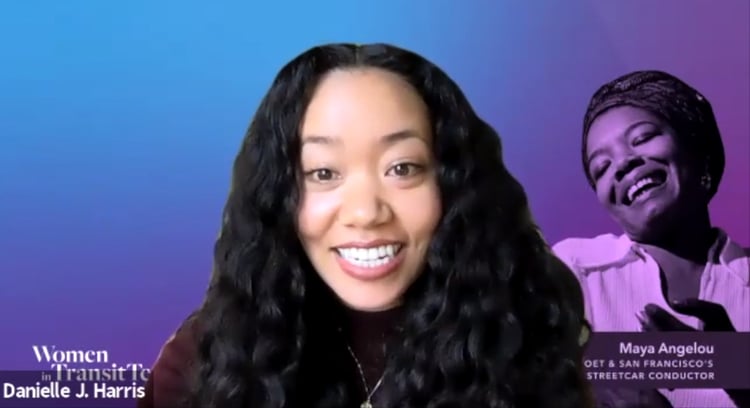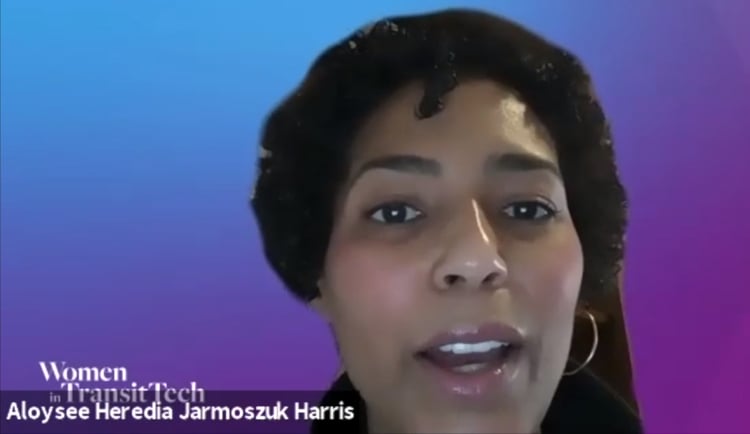In honor of Women’s History Month, Via and Remix organized the Women in TransitTech Summit 2021. Hosted by Remix co-founder Tiffany Chu, the Summit featured an all-female panel of transportation technology innovators:
- Danielle J. Harris – As the Director of Mobility Innovation at Elemental Excelerator, Danielle works with entrepreneurs and investors on technologies that can help address climate change alongside social equity issues.
- Aloysee Heredia Jarmoszuk – Currently the Commissioner and Chair of the New York City Taxi & Limousine Commission (TLC), Aloysee leads a staff of 600+ employees tackling initiatives like transit accessibility, inclusivity, and traffic safety.
- Corinne Kisner – As Executive Director of the National Association of City Transportation Officials (NACTO), Corinne works with transportation leaders from 86 cities across North America to advance NACTO’s mission of building cities with safe, sustainable, accessible, and equitable transportation.
Our panelists candidly shared their perspectives on carving out space in the typically male-dominated transportation industry, empowering other women in their careers, and the steps needed to build better public mobility in a COVID-19 world.
Here are some compelling insights shared at our Women in TransitTech Summit 2021.
What was something that surprised you, or that you wished someone had told you sooner about pursuing a career in transit technology as a woman?
To kick off the conversation, Tiffany asked our panelists to reflect on their experiences as women in the transit industry and comment on any surprises or unexpected challenges they faced while growing as leaders. The panelists shared inspiring stories about recognizing and overcoming stereotypes in the workplace, the importance of carving out space for yourself, and finding your own authentic voice.
“There’s no reason to try to fit in. The reality is you’re going to stand out, so you might as well stand out for the right reasons.”
— Danielle J. Harris
“Part of my journey has been finding my voice in [TransitTech] spaces and figuring out how to own a voice that actually is a little bit different than others that are in the room, and being okay with that. And not having to feel like I have to match what I’m hearing in those spaces, but bringing a perspective that might not have been there already.”
— Corinne Kisner

What is one thing that you’ve done to influence the conversation around gender, diversity, and inclusion? What have you done recently to elevate other women in our space?
Next, the conversation shifted to issues of gender diversity and equity, and empowering other women in transit and technology spaces. Tiffany asked each of our panelists to talk about recent activities and initiatives they had undertaken to elevate other women and promote gender diversity and inclusion. Our panelists talked about their efforts to remain accessible for their team members and colleagues, encouraging dialogue and divergent thought in meetings, and why it’s important for women to follow their leadership goals and ambitions in the transit and technology industries.
“I’m very intentional about inclusivity across the board, and to really acknowledging and seeing people, engaging folks in conversation, and making them feel like they’re a part of the journey. Being approachable, being available, and then engaging everybody is something I’ve been very intentional about over the last year.”
— Aloysee Heredia Jarmoszak
“Encouraging my team and others to speak up and say something if they don’t agree. I think divergent thought is really something to be cultivated.
I’ve been giving out references lately and so I’m telling everybody to shoot your shot. If you want that manager or director position, go for it. I’m happy to give you a reference as long as you promise me you will negotiate, because if you decide to take less, you’re telling them that we’ll all take less.”
— Danielle J. Harris

What does the future of public mobility look like in a post-COVID world? What are the best things we can preserve into the future, and how do we ensure that no one is left behind the next time a catastrophe occurs?
For this closing question, we shifted the conversation back to issues of transit and mobility—a space where our panelists are passionately engaged in their professional careers. Tiffany asked our panelists to comment on the future of public mobility in a COVID-19 world and how our communities can both continue the recovery process and prepare for the challenges of the future.
Our panelists shared insights on how public spaces and transportation were impacted by COVID-19, the challenges of navigating the crisis response, and the need to build the future of transportation in an equitable and sustainable way.
“This year at NACTO we offered small grants to cities and their community partners to implement a project that helped utilize city streets for pandemic response and recovery – something like a pop-up bike lane to support essential trips, slowing down traffic so people could safely walk, or supporting outdoor dining to provide local economic options.
The projects where city and community groups already had strong partnerships were the most successful, and I think the really important lesson there as we move from crisis response into longer term recovery is that relationships and the community partnerships are so critical. That work needs to happen on an ongoing basis so that the foundations are there in moments of crisis.”
— Corinne Kisner
“We want to make sure that we’re seeking all new forms of transit together so we can all continue to exist and coexist towards the future”.
— Aloysee Heredia Jarmoszak

We’d like to express our appreciation to these three amazing panelists and all the attendees who helped make the Women in TransitTech Summit 2021 a success!
Read how we celebrated Women’s Equality Day at Remix.

.png?width=71&height=47&name=Sioux%20Falls%20Webinar%20(6).png)


